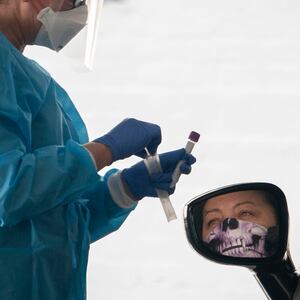The pharmaceutical firm Moderna has reported good results so far in trials of its novel-coronavirus vaccine, inspiring cautious optimism in scientists scrambling to contain the damage from the ongoing pandemic.
But these same scientists warn against getting too excited about early results, however positive. The world could still be a long way from having a working vaccine for SARS-CoV-2, to say nothing of deploying that vaccine on a large scale.
Welcome to Rabbit Hole, where we dive deep on the biggest story. It’s for Beast Inside members only. Join up today.
Massachusetts-based Moderna was one of the first American firms to launch phase-one trials of a potential novel-coronavirus vaccine. With backing from the National Institute of Allergies and Infectious Diseases, the firm began testing on patients at Kaiser Permanente Washington Health Research Institute in Seattle in mid-March.
The first patients received doses of Moderna’s mRNA-1273 vaccine on March 16. Anthony Fauci, director of the NIAID, described the trial as an “important first step” in addressing the pandemic, which by Monday has killed more than 300,000 people worldwide, including more than 90,000 in the United States.
Moderna dosed three groups of 15 patients each, all between the ages of 18 and 55, with 25 micrograms, 100 micrograms and 250 micrograms of mRNA-1273, respectively. The 25- and 100-microgram groups received two doses of the vaccine within 43 days. The 250-microgram group got just one dose.
Two months later, Moderna announced the tentative good news. “Dose-dependent increases in immunogenicity were seen across the three dose levels,” the company stated in a release. In other words, patients receiving the vaccine have been producing antibodies that could, in theory, work to “bind” SARS-CoV-2 and stop or limit the damage the pathogen inflicts.
Plus, the vaccine appears to be safe, Moderna added. “MRNA-1273 was generally safe and well tolerated, with a safety profile consistent with that seen in prior Moderna infectious disease vaccine clinical studies.”
“Promising early results,” Matthew Scotch, an Arizona State University epidemiologist, told The Daily Beast.
But Stephen Jameson, a University of Minnesota pathologist, cautioned against reading too much into Moderna’s announcement. “Not a huge amount to say yet,” Jameson told The Daily Beast. “This is a standard small-scale phase-one trial, chiefly for safety.”
After 15 days, all 45 patients in Moderna’s trials began producing antibodies, the firm reported. After 43 days, eight patients in the 25- and 100-microgram groups were showing levels of antibodies that matched, or exceeded, the antibodies in so-called “convalescent plasma.”
Convalescent plasma is blood plasma from recovered COVID-19 patients that doctors use to treat patients who are still battling the disease. A nationwide effort is underway to collect and distribute convalescent plasma.
While the results in these eight patients is encouraging, they’re far from conclusive. Scotch said he’s “looking forward to seeing the results in a larger cohort.”
Moderna is still awaiting data on the other 37 patients in the phase-one trials. Assuming the company moves forward with mRNA-1273, a second and more intensive phase of trials could involve hundreds of patients.
Phase three, the final phase before possible Food and Drug Administration approval, could involve thousands of test subjects. Completing all three phases typically takes years. The FDA has pledged to accelerate the process for companies working on coronavirus vaccines.
The critical questions for Moderna as it continues phase one of its coronavirus-vaccine trials is how long the antibodies last and whether they offer meaningful protection against SARS-CoV-2, Jameson explained.
It’s entirely possible that Moderna’s mRNA-1273 produces antibodies that don’t actually work. The mere presence of antibodies does not imply immunity. “I am still concerned that the antibodies induced against the SARS-CoV-2 spike protein may not alter the course of disease,” David Ostrov, a virologist at the University of Florida, told The Daily Beast. “They might, and they might not.”
Still, the initial results are reason for cautious optimism. “Doesn’t look like any bad news, for sure,” Jameson said, “and certainly seeing neutralizing antibodies induced by the vaccine at levels similar to or above convalescent plasma is exciting.”
“This is about as promising as one could expect at this very early stage and definitely justifies the plans to proceed with the trial.”







